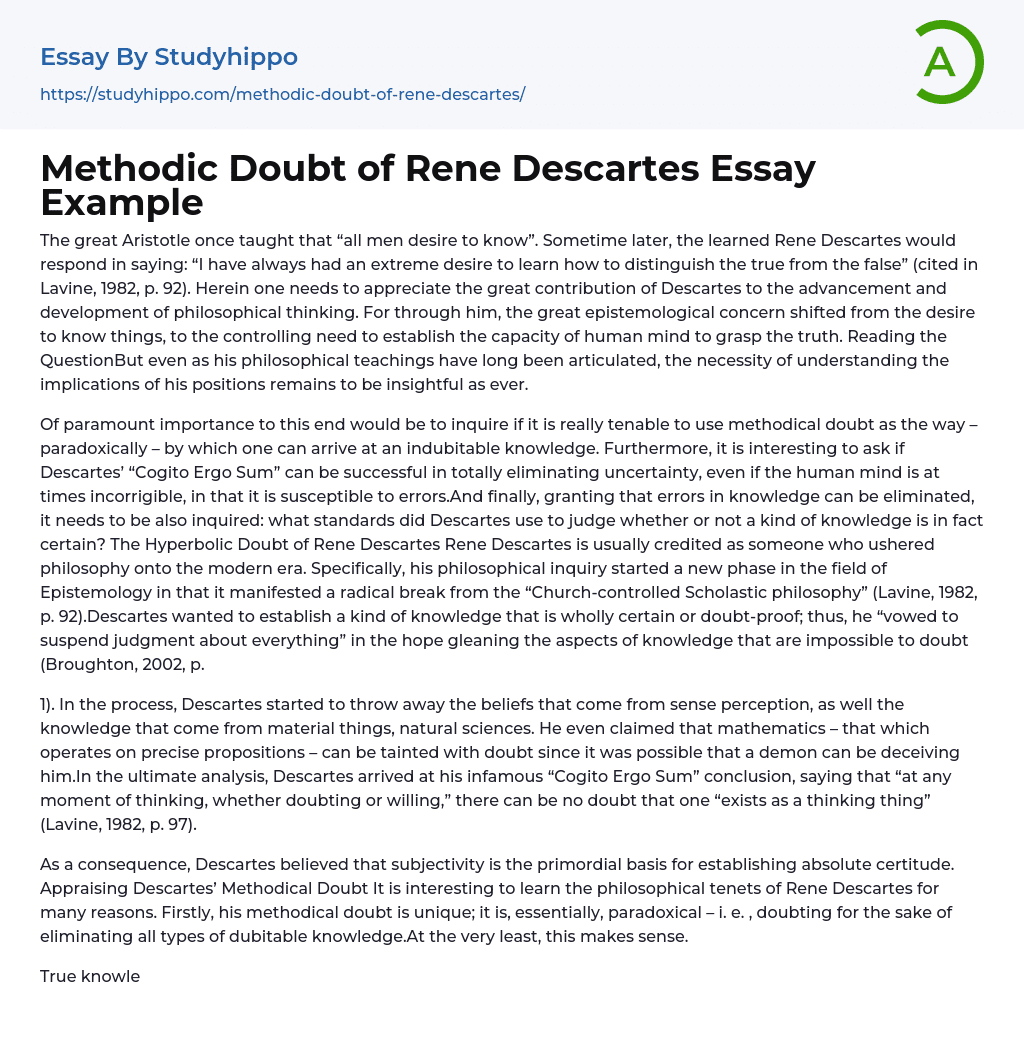The great Aristotle once taught that “all men desire to know”. Sometime later, the learned Rene Descartes would respond in saying: “I have always had an extreme desire to learn how to distinguish the true from the false” (cited in Lavine, 1982, p. 92). Herein one needs to appreciate the great contribution of Descartes to the advancement and development of philosophical thinking. For through him, the great epistemological concern shifted from the desire to know things, to the controlling need to establish the capacity of human mind to grasp the truth. Reading the QuestionBut even as his philosophical teachings have long been articulated, the necessity of understanding the implications of his positions remains to be insightful as ever.
Of paramount importance to this end would be to inquire if it is really tenable to use methodical doubt as th
...e way – paradoxically – by which one can arrive at an indubitable knowledge. Furthermore, it is interesting to ask if Descartes’ “Cogito Ergo Sum” can be successful in totally eliminating uncertainty, even if the human mind is at times incorrigible, in that it is susceptible to errors.And finally, granting that errors in knowledge can be eliminated, it needs to be also inquired: what standards did Descartes use to judge whether or not a kind of knowledge is in fact certain? The Hyperbolic Doubt of Rene Descartes Rene Descartes is usually credited as someone who ushered philosophy onto the modern era. Specifically, his philosophical inquiry started a new phase in the field of Epistemology in that it manifested a radical break from the “Church-controlled Scholastic philosophy” (Lavine, 1982, p. 92).Descartes wanted to establish a kind of knowledge
that is wholly certain or doubt-proof; thus, he “vowed to suspend judgment about everything” in the hope gleaning the aspects of knowledge that are impossible to doubt (Broughton, 2002, p.
1). In the process, Descartes started to throw away the beliefs that come from sense perception, as well the knowledge that come from material things, natural sciences. He even claimed that mathematics – that which operates on precise propositions – can be tainted with doubt since it was possible that a demon can be deceiving him.In the ultimate analysis, Descartes arrived at his infamous “Cogito Ergo Sum” conclusion, saying that “at any moment of thinking, whether doubting or willing,” there can be no doubt that one “exists as a thinking thing” (Lavine, 1982, p. 97).
As a consequence, Descartes believed that subjectivity is the primordial basis for establishing absolute certitude. Appraising Descartes’ Methodical Doubt It is interesting to learn the philosophical tenets of Rene Descartes for many reasons. Firstly, his methodical doubt is unique; it is, essentially, paradoxical – i. e. , doubting for the sake of eliminating all types of dubitable knowledge.At the very least, this makes sense.
True knowledge, one needs to remember, cannot rest on ambiguous or dubitable presuppositions. Secondly, it is interesting to learn Descartes’ philosophy since he has launched an ambitious project to say the least – to arrive at an absolutely indubitable knowledge. Promising as this project may sound however, there are good reasons to claim that one cannot really arrive at an absolutely certain kind of knowledge, without reference to any assumption whatsoever. For instance, people always assume that the sun will shine up in the morning.However dubitable,
it rests on a truthful assumption that the laws of nature, reliable as it were, shall take its course.
Summary In sum, it needs to be mentioned that Descartes has been successful in introducing a new methodology for philosophical inquiry. His epistemic concern lies not in plainly knowing things as in knowing what the truth is. And while one may, on a careful analysis, not arrive at an absolutely certain knowledge, since the human mind is finite and limited, Descartes’ philosophy has nevertheless emphasized that the need to approximate the truth is quite essential for life.
- Ambition essays
- Anger essays
- Betrayal essays
- Boredom essays
- Confidence essays
- Courage essays
- Desire essays
- Disgrace essays
- Doubt essays
- Empathy essays
- Fairness essays
- Fear essays
- Feeling essays
- Forgiveness essays
- Grief essays
- Guilt essays
- Happiness essays
- Harmony essays
- Hate essays
- Honesty essays
- Honor essays
- Hope essays
- Humanity essays
- Inspiration essays
- Kindness essays
- Laughter essays
- Loneliness essays
- Lost essays
- Loyalty essays
- Need essays
- Passion essays
- Pressure essays
- Pride essays
- Regret essays
- Respect essays
- Responsibility essays
- Sarcasm essays
- Shame essays
- Suffering essays
- Suspense essays
- Tolerance essays
- Acceptance essays
- Age Of Enlightenment essays
- Child Observation essays
- Confucianism essays
- Conscience essays
- Critical Reflection essays
- Destiny essays
- Determinism essays
- Empiricism essays




